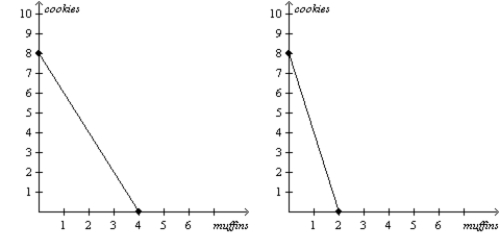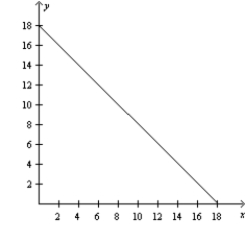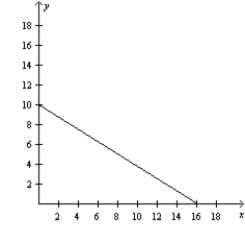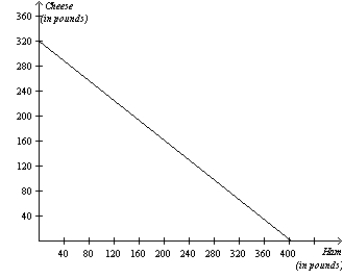Exam 3: Interdependence and the Gains From Trade
Exam 1: Ten Principles of Economics438 Questions
Exam 2: Thinking Like an Economist620 Questions
Exam 3: Interdependence and the Gains From Trade527 Questions
Exam 4: The Market Forces of Supply and Demand700 Questions
Exam 5: Elasticity and Its Application598 Questions
Exam 6: Supply, Demand, and Government Policies648 Questions
Exam 7: Consumers, Producers, and the Efficiency of Markets550 Questions
Exam 8: Application: The Costs of Taxation514 Questions
Exam 9: Application: International Trade496 Questions
Exam 10: Externalities522 Questions
Exam 11: Public Goods and Common Resources434 Questions
Exam 12: The Costs of Production420 Questions
Exam 13: Firms in Competitive Markets543 Questions
Exam 14: Monopoly637 Questions
Exam 15: Measuring a Nations Income522 Questions
Exam 16: Measuring the Cost of Living545 Questions
Exam 17: Production and Growth507 Questions
Exam 18: Saving, Investment, and the Financial System567 Questions
Exam 19: The Basic Tools of Finance513 Questions
Exam 20: Unemployment699 Questions
Exam 21: The Monetary System518 Questions
Exam 22: Money Growth and Inflation487 Questions
Exam 23: Aggregate Demand and Aggregate Supply563 Questions
Exam 24: The Influence of Monetary and Fiscal Policy on Aggregate Demand512 Questions
Select questions type
Table 3-10
Assume that Japan and Korea can switch between producing cars and producing airplanes at a constant rate.
 -Refer to Table 3-10. Assume that Japan and Korea each has 2400 hours available. If each country divides its time equally between the production of cars and airplanes, then total production is
-Refer to Table 3-10. Assume that Japan and Korea each has 2400 hours available. If each country divides its time equally between the production of cars and airplanes, then total production is
(Multiple Choice)
4.8/5  (41)
(41)
Olivia bakes cakes and Andrew grows corn. Olivia and Andrew both like to eat cake and eat corn. In which of the following cases is it impossible for both Olivia and Andrew to benefit from trade?
(Multiple Choice)
4.7/5  (41)
(41)
Table 3-33
Chris and Tony's Production Opportunities
 -Refer to Table 3-33 Chris and Tony both produce tomatoes and pasta sauce. The table shows their possible production per month if both work the same number of 8 hour days. Given this information, Chris's opportunity cost of 1 lb. of tomatoes is
-Refer to Table 3-33 Chris and Tony both produce tomatoes and pasta sauce. The table shows their possible production per month if both work the same number of 8 hour days. Given this information, Chris's opportunity cost of 1 lb. of tomatoes is
(Multiple Choice)
4.8/5  (33)
(33)
Table 3-36
 -Refer to Table 3-36. Antigua has an absolute advantage in the production of
-Refer to Table 3-36. Antigua has an absolute advantage in the production of
(Multiple Choice)
4.7/5  (41)
(41)
Trade can benefit everyone in society because it allows people to specialize in activities in which they have a comparative advantage.
(True/False)
4.9/5  (36)
(36)
Table 3-22
Assume that Zimbabwe and Portugal can switch between producing toothbrushes and producing hairbrushes at a constant rate.
 -Refer to Table 3-22. Zimbabwe has an absolute advantage in the production of
-Refer to Table 3-22. Zimbabwe has an absolute advantage in the production of
(Multiple Choice)
4.8/5  (34)
(34)
In one month, Moira can knit 2 sweaters or 4 scarves. In one month, Tori can knit 1 sweater or 3 scarves. Moira's opportunity cost of knitting scarves is lower than Tori's opportunity cost of knitting scarves.
(True/False)
4.9/5  (35)
(35)
With eight hours of work Elmer can produce 20 pounds of carrots or 15 pounds of peas. With eight hours Bugs can produce 10 pounds of carrots or 7.5 pounds of peas. Can Elmer and Bugs gain from trade? Defend your answer.
(Essay)
4.8/5  (44)
(44)
Figure 3-26
Mary's Production Possibilities Frontier Kate's Production Possibilities Frontier  -Refer to Figure 3-26. What is Kate's opportunity cost of one cookie?
-Refer to Figure 3-26. What is Kate's opportunity cost of one cookie?
(Short Answer)
4.7/5  (33)
(33)
Table 3-5
Assume that Aruba and Iceland can switch between producing coolers and producing radios at a constant rate.
 -Refer to Table 3-5. Which of the following represents Iceland's production possibilities frontier when 100 labor hours are available?
-Refer to Table 3-5. Which of the following represents Iceland's production possibilities frontier when 100 labor hours are available?
(Multiple Choice)
4.7/5  (36)
(36)
An assumption of the production possibilities frontier model is that technology is fixed.
(True/False)
4.8/5  (31)
(31)
Figure 3-4
Lisa's Production Possibilities Frontier Bryce's Production Possibilities Frontier
 -Refer to Figure 3-4. If Bryce must work 4 months to produce each sweater, then his production possibilities frontier is based on how many months of work?
-Refer to Figure 3-4. If Bryce must work 4 months to produce each sweater, then his production possibilities frontier is based on how many months of work?
(Multiple Choice)
4.9/5  (40)
(40)
Table 3-6
Assume that Zimbabwe and Portugal can switch between producing toothbrushes and producing hairbrushes at a constant rate.
 -Refer to Table 3-6. Assume that Zimbabwe and Portugal each has 180 machine minutes available. If each country divides its time equally between the production of toothbrushes and hairbrushes, then total production is
-Refer to Table 3-6. Assume that Zimbabwe and Portugal each has 180 machine minutes available. If each country divides its time equally between the production of toothbrushes and hairbrushes, then total production is
(Multiple Choice)
5.0/5  (30)
(30)
Figure 3-24
The production possibilities frontiers below show how much Bob and Betty can each produce in 8 hours of time.
Bob's Production Possibilities Frontier Betty's Production Possibilities Frontier

 -Refer to Figure 3-24. Betty has
-Refer to Figure 3-24. Betty has
(Multiple Choice)
4.9/5  (50)
(50)
A: Comparative Advantage: The Driving Force of Specialization
-Assume for the United States that the opportunity cost of each airplane is 50 cars. Which of these pairs of points could be on the United States' production possibilities frontier?
(Multiple Choice)
4.8/5  (27)
(27)
Table 3-30
Assume that Falda and Varick can switch between producing wheat and producing cloth at a constant rate.
 -Refer to Table 3-30. Varick has an absolute advantage in the production of
-Refer to Table 3-30. Varick has an absolute advantage in the production of
(Multiple Choice)
4.9/5  (34)
(34)
The principle of comparative advantage states that, regardless of the price at which trade takes place, everyone will benefit from trade if they specialize in the production of the good for which they have a comparative advantage.
(True/False)
4.9/5  (35)
(35)
Table 3-16
The following table contains some production possibilities for an economy for a given month.
 -Refer to Table 3-16. If the production possibilities frontier is bowed outward, then "?" could be
-Refer to Table 3-16. If the production possibilities frontier is bowed outward, then "?" could be
(Multiple Choice)
4.8/5  (42)
(42)
Figure 3-11
The graph below represents the various combinations of ham and cheese in pounds) that the nation of Bonovia could produce in a given month.  -Refer to Figure 3-11. If the production possibilities frontier shown is for 240 hours of production, then how long does it take Bonovia to make one pound of cheese?
-Refer to Figure 3-11. If the production possibilities frontier shown is for 240 hours of production, then how long does it take Bonovia to make one pound of cheese?
(Multiple Choice)
4.8/5  (34)
(34)
Showing 41 - 60 of 527
Filters
- Essay(0)
- Multiple Choice(0)
- Short Answer(0)
- True False(0)
- Matching(0)